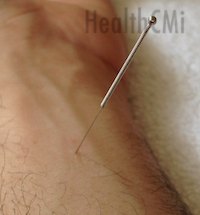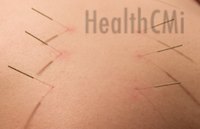Acupuncture and Chinese herbal medicine are found effective for the alleviation of IBS (irritable bowel syndrome). Two independent investigations confirm that acupuncture, as a standalone therapy, or acupuncture combined with the herbal formula Si Shen Wan (Four Miracle Pill) is safe and effective. Additionally, investigators confirm that acupuncture is more effective than loperamide, a synthetic opiate used to control diarrhea by inhibiting peristalsis (wavelike intestinal constriction and relaxation).
Heilongjiang Traditional Chinese Medicine Hospital researchers determined that acupuncture, as a standalone therapy, produces a 92.19% total effective rate for the treatment of IBS. A group receiving loperamide plus Si Shen Wan achieved a 72.88% total effective rate. The acupuncture group outperformed the drug plus herbs group by 19.39%. The total effective rate includes all patients that completely recovered or those that had significant relief of symptoms with less frequency of IBS and improved daily life activity functioning.
In an independent investigation, Chongqing Nanchuan Traditional Chinese Medicine Hospital researchers determined that acupuncture plus Si Shen Wan is more effective than loperamide plus Si Shen Wan. Acupuncture plus Si Shen Wan was significantly more effective for the reduction of abdominal pain and discomfort and also for controlling bouts of excessive bowel movement frequency than loperamide plus Si Shen Wan. Acupuncture plus herbs was also successful in improving stool consistency and appearance, bloating, and fecal incontinence whereas the drug plus herbs group did not show significant improvements in these areas.
An SF-6 health survey (a variant of the SF-36), reveals that acupuncture plus herbs produces additional advantages over drugs plus herbs. Acupuncture plus herbs significantly improves the following: vitality, bodily pain levels, role limitations due to physical health, physical functioning, role limitations due to emotional health, mental health, social functioning. The drugs plus herbs group showed more modest improvements that were limited to only two of these areas of health: bodily pain levels, role limitations due to physical health.
An IBS-QOL (disease specific questionnaire) demonstrates additional advantages to acupuncture over drugs. Acupuncture plus herbs produced significant improvements in the following areas: interference with activity, dysphoria, health concern, body image, food avoidance. Drugs plus herbs produced a minor benefit for food avoidance only.



